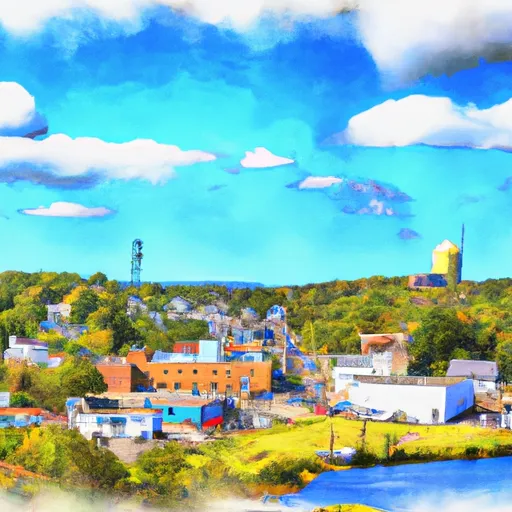-
 Snoflo Premium
Snoflo Premium
Get unlimited access to all our content
With no Ad interruptions! - Start Your Free Trial Login with existing account
Sullivan
Eden Index
Climate
7.9
•
Recreation
4.9
•
Community
1.8
•
Safeguard
5.3/10

Sullivan, Maine is a picturesque town located in the United States, known for its unique climate and abundant outdoor recreation opportunities. The town experiences a humid continental climate, characterized by warm summers and cold winters. Summers are typically mild with temperatures ranging from 60°F to 80°F, while winters are cold with temperatures often dropping below freezing.
Sullivan benefits from its hydrology constituents, being situated near the stunning Frenchman Bay and Taunton Bay. These bodies of water provide residents and visitors with opportunities for activities such as boating, fishing, and kayaking. The region also boasts numerous lakes and ponds, offering additional options for water-based recreation.
Outdoor enthusiasts will find Sullivan to be a haven for nature exploration and hiking. The town is bordered by forests and features several trails, including the well-known Taunton Bay Trails. These trails offer stunning views of the surrounding landscapes and opportunities to observe wildlife.
Furthermore, Sullivan is a gateway to the renowned Acadia National Park, which is just a short drive away. This national park offers a plethora of outdoor activities, including hiking, camping, rock climbing, and wildlife watching.
In conclusion, Sullivan, Maine provides an idyllic setting for individuals seeking a diverse climate, access to water bodies, and ample outdoor recreation opportunities. Whether it's enjoying the beauty of the bays or exploring the trails and parks, this charming town offers something for everyone.
What is the Eden Index?
The Snoflo Eden Index serves as a comprehensive rating system for regions, evaluating their desirability through a holistic assessment of climate health, outdoor recreation opportunities, and natural disaster risk, acknowledging the profound impact of these factors on livability and well-being.
Climate Health Indicator (CHI): 7.9
Sullivan receives approximately
1299mm of rain per year,
with humidity levels near 76%
and air temperatures averaging around
8°C.
Sullivan has a plant hardyness factor of
5, meaning
plants and agriculture in this region thrive during a short period during spring and early summer. Most
plants will die off during the colder winter months.
By considering the ideal temperature range, reliable water supplies, clean air, and stable seasonal rain or snowpacks, the Climate Health Indicator (CHI) underscores the significance of a healthy climate as the foundation for quality living.
A healthy climate is paramount for ensuring a high quality of life and livability in a region, fostering both physical well-being and environmental harmony. This can be characterized by ideal temperatures, reliable access to water supplies, clean air, and consistent seasonal rain or snowpacks.
Weather Forecast
Streamflow Conditions
Area Rivers
Snowpack Depths
Reservoir Storage Capacity
Groundwater Levels
Recreational Opportunity Index (ROI): 4.9
The Recreational Opportunity Index (ROI) recognizes the value of outdoor recreational options, such as parks, hiking trails, camping sites, and fishing spots, while acknowledging that climate plays a pivotal role in ensuring the comfort and consistency of these experiences.
Access to outdoor recreational opportunities, encompassing activities such as parks, hiking, camping, and fishing, is crucial for overall well-being, and the climate plays a pivotal role in enabling and enhancing these experiences, ensuring that individuals can engage in nature-based activities comfortably and consistently.
Camping Areas
| Campground | Campsites | Reservations | Toilets | Showers | Elevation |
|---|---|---|---|---|---|
| Blackwoods - Acadia National Park | 306 | 193 ft | |||
| Great Pond Military | None | 302 ft | |||
| Lamoine State Park | 60 | 93 ft | |||
| Seawall - Acadia National Park | 214 | 35 ft |
Catastrophe Safeguard Index (CSI):
The Catastrophe Safeguard Index (CSI) recognizes that natural disaster risk, encompassing floods, fires, hurricanes, and tornadoes, can drastically affect safety and the overall appeal of an area.
The level of natural disaster risk in a region significantly affects safety and the overall livability, with climate change amplifying these risks by potentially increasing the frequency and intensity of events like floods, fires, hurricanes, and tornadoes, thereby posing substantial challenges to community resilience and well-being.
Community Resilience Indicator (CRI): 1.8
The Community Resilience Indicator (CRI) recognizes that education, healthcare, and socioeconomics are crucial to the well-being of a region. The CRI acknowledges the profound impact of these elements on residents' overall quality of life. By evaluating educational resources, healthcare accessibility, and economic inclusivity, the index captures the essential aspects that contribute to a thriving community, fostering resident satisfaction, equity, and social cohesion.

